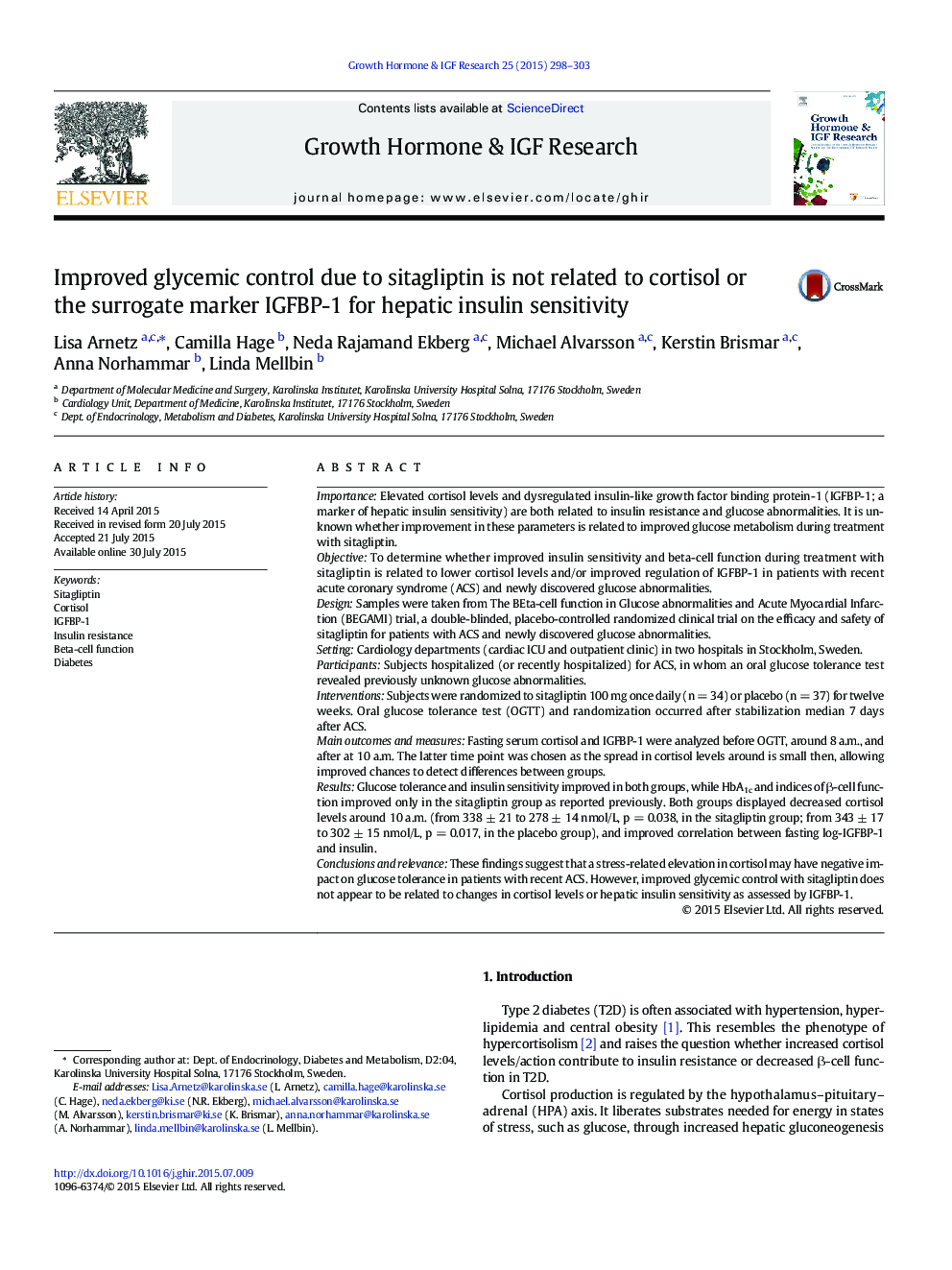| کد مقاله | کد نشریه | سال انتشار | مقاله انگلیسی | نسخه تمام متن |
|---|---|---|---|---|
| 2802606 | 1156695 | 2015 | 6 صفحه PDF | دانلود رایگان |

• Cortisol levels decreased in all subjects 12 weeks after acute coronary syndrome, regardless of treatment with sitagliptin or placebo.
• Cortisol may have negative impact on glucose tolerance in patients with recent ACS.
• Sitagliptin does not appear affect cortisol levels or IGFBP-1.
ImportanceElevated cortisol levels and dysregulated insulin-like growth factor binding protein-1 (IGFBP-1; a marker of hepatic insulin sensitivity) are both related to insulin resistance and glucose abnormalities. It is unknown whether improvement in these parameters is related to improved glucose metabolism during treatment with sitagliptin.ObjectiveTo determine whether improved insulin sensitivity and beta-cell function during treatment with sitagliptin is related to lower cortisol levels and/or improved regulation of IGFBP-1 in patients with recent acute coronary syndrome (ACS) and newly discovered glucose abnormalities.DesignSamples were taken from The BEta-cell function in Glucose abnormalities and Acute Myocardial Infarction (BEGAMI) trial, a double-blinded, placebo-controlled randomized clinical trial on the efficacy and safety of sitagliptin for patients with ACS and newly discovered glucose abnormalities.SettingCardiology departments (cardiac ICU and outpatient clinic) in two hospitals in Stockholm, Sweden.ParticipantsSubjects hospitalized (or recently hospitalized) for ACS, in whom an oral glucose tolerance test revealed previously unknown glucose abnormalities.InterventionsSubjects were randomized to sitagliptin 100 mg once daily (n = 34) or placebo (n = 37) for twelve weeks. Oral glucose tolerance test (OGTT) and randomization occurred after stabilization median 7 days after ACS.Main outcomes and measuresFasting serum cortisol and IGFBP-1 were analyzed before OGTT, around 8 a.m., and after at 10 a.m. The latter time point was chosen as the spread in cortisol levels around is small then, allowing improved chances to detect differences between groups.ResultsGlucose tolerance and insulin sensitivity improved in both groups, while HbA1c and indices of β-cell function improved only in the sitagliptin group as reported previously. Both groups displayed decreased cortisol levels around 10 a.m. (from 338 ± 21 to 278 ± 14 nmol/L, p = 0.038, in the sitagliptin group; from 343 ± 17 to 302 ± 15 nmol/L, p = 0.017, in the placebo group), and improved correlation between fasting log-IGFBP-1 and insulin.Conclusions and relevanceThese findings suggest that a stress-related elevation in cortisol may have negative impact on glucose tolerance in patients with recent ACS. However, improved glycemic control with sitagliptin does not appear to be related to changes in cortisol levels or hepatic insulin sensitivity as assessed by IGFBP-1.
Journal: Growth Hormone & IGF Research - Volume 25, Issue 6, December 2015, Pages 298–303